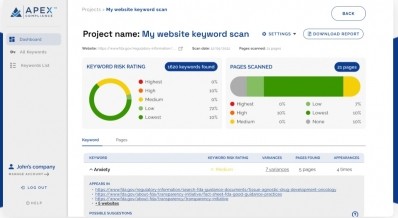AHPA: ‘Amazon reportedly enforces erroneous FDA adulteration allegation’

“AHPA has expended significant staff time and resources in addressing this issue, and we will continue to advocate for the accurate interpretation of the robust regulations that govern dietary supplements under federal law,” AHPA President Michael McGuffin said in a statement last week. “With regard to the specific matter addressed here, AHPA will call on FDA to publicly acknowledge its error regarding Pinellia ternata and for Amazon to resume permitting sales of compliant Pinellia ternata dietary supplements on its platform.”
Amazon’s prohibition on the sale was flagged by an unnamed AHPA member.
Improper interpretation
“Of most concern is the improper interpretation of a federal regulation – in this case, 21 C.F.R. § 119.1, which deems dietary supplements containing ephedrine alkaloids as ‘adulterated’ – that has reportedly led Amazon to prohibit the sale of products containing Pinellia ternata," an AHPA spokesperson told NutraIngredients-USA.
In March 2021, FDA conducted an inspection of San Gabriel, CA-based marketer of dietary supplements Princess Lifestyles before issuing a warning letter in Feb. 2022 contending that the company's Stomaisu product was adulterated because its label “lists Pinellia ternata, a dietary ingredient which contains ephedrine alkaloids”. FDA also noted drug claims and cGMP concerns with other Princess Lifestyles products.
Popular in the 1990s and early 2000s as a weight management ingredient, ephedra was banned in 2004 by federal regulation 21 C.F.R. § 119.1 because of serious safety risks. In the preamble to the final ruling, the FDA cited a 1978 study that claimed to isolate ephedrine hydrochloride from a tested sample described as dried tuber of Pinellia ternata.
“The cited regulation, however, only deems as ‘adulterated’ products actually containing ephedrine alkaloids,” AHPA stated, pointing to a 2021 analysis of 55 samples of Pinellia ternata tuber that failed to detect ephedrine in any of the samples. "Thus, there exists (at best) uncertainty about whether Pinellia ternata tuber actually contains ephedrine alkaloids.”
Failure to test
AHPA also took issue with what appeared to be FDA failure to analyze Princess Lifestyle’s Pinellia ternata product to confirm the presence of ephedrine alkaloids prior to asserting the violation.
According to AHPA, based on material provided to a Freedom of Information Act request, a subsequent FDA laboratory analysis determined that a Princess Lifestyle’s sample did not detect any ephedrine alkaloid at or above the detection threshold of 0.5 ug/g.
“As a general matter, FDA agrees that the determination of a dietary supplement as adulterated under 21 CFR 119.1 should be based on the product containing ephedrine alkaloids,” the FDA confirmed in a Feb. 2023 statement shared by AHPA. “In the absence of clear evidence that a product contains ephedrine alkaloids, FDA agrees that such a product would not be adulterated under 21 CFR 119.1.”
NutraIngredients-USA reached out to FDA, but an agency spokesperson said that FDA does not discuss the compliance status of specific products with third parties.
The bigger issue
Although AHPA said its efforts seem to have resolved the issue at FDA, it continues to mobilize to ensure that Amazon acknowledges the error and reinstates the sale of the Pinellia ternata-containing products.
“The bigger issue is that Amazon is effectively acting as an enforcement authority and wrongfully barring the sale of compliant products, an action that – if applied to other dietary supplements – damages the broader industry and limits lawful access to these products by our families, friends, and neighbors,” the AHPA spokesperson said.
AHPA will host a members’ meeting on April 26 to address this and other concerns regarding federal enforcement policies, requesting that others who have experienced similar issues come forward.
“In addition to Amazon's reported enforcement of FDA's erroneous adulteration allegation, we will also be discussing FTC's issuance of almost 700 notices of penalty offenses to companies marketing health-related products and AHPA discussions with FDA over reports of inconsistency in enforcement of dietary supplement cGMP requirements at the upcoming special member meeting,” the AHPA spokesperson said.
Amazon did not respond to a request for comment prior to publication.















